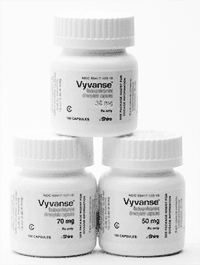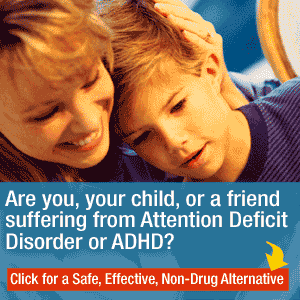
Even though Vyvanse is new, its active ingredient has been around since the 1920s.
Vyvanse Side Effects and Warnings
Schedule II Substance
Dextroamphetamine Composite
- Brand Names: VYVANSE
- Generic Name: LISDEXAMFETAMINE (dextroamphetamine with lysine)
- Category: CEREBRAL STIMULANTS
FDA “Black Box” Warning Label
The Food and Drug Administration (FDA) requires the following "black box" warning on all amphetamines, including Vyvanse, which means that medical studies indicate Vyvanse carries a significant risk of serious, or even life-threatening, adverse effects.
WARNING
AMPHETAMINES HAVE A HIGH POTENTIAL FOR ABUSE. ADMINISTRATION OF AMPHETAMINES FOR PROLONGED PERIODS OF TIME MAY LEAD TO DRUG DEPENDENCE AND MUST BE AVOIDED. PARTICULAR ATTENTION SHOULD BE PAID TO THE POSSIBILITY OF SUBJECTS OBTAINING AMPHETAMINES FOR NONTHERAPEUTIC USE OR DISTRIBUTION TO OTHERS, AND THE DRUGS SHOULD BE PRESCRIBED OR DISPENSED SPARINGLY.
MISUSE OF AMPHETAMINE MAY CAUSE SUDDEN DEATH AND SERIOUS CARDIOVASCULAR ADVERSE EVENTS.
Using amphetamines once is sufficient to induce some of these symptoms:
Short-Term Effects:
- Enhanced mood and body movement
- Increased wakefulness, physical activity
- Increased respiration
- Euphoria
- Insomnia
- Increased heart rate
- Increased blood pressure
- Reduced appetite
- Cardiovascular collapse, death
- Dilated pupils
Long-Term Effects:
- Damage to brain cells containing serotonin
- Over time, reduced level of dopamine resulting in Parkinson's-like symptoms
- Weight loss
- Confusion
- Tremors
- Convulsion
- Paranoia
- Hallucinations
- Damage to nerve cells, causing strokes
- Cardiovascular collapse, death
Effects from Withdrawal:
- Irritability
- Anxiety
- Paranoia
- Aggressiveness
- Fatigue and long periods of sleep
- Depression
Behaviors resulting from amphetamine intoxication such as withdrawal from others, experiencing hallucinations, paranoia, delirium perhaps occurring with violence and stereotyped behaviors such as repeatedly assembling and dissembling electronic equipment may resemble symptoms of schizophrenia. But a skilled clinician should be able to make the proper diagnosis.
“Amphetamine, as with cocaine, can induce symptoms similar to those seen in obsessive disorder, panic disorder, and phobic disorders.”
“High doses and long-term use of amphetamines are associated with erectile disorder and other sexual dysfunctions.”
Description
Although Vyvanse is referred to as “pro-drug” of dextroamphetamine, it is still an amphetamine, meaning that it is easily abused and can cause insomnia, agitation, anxiety and sometimes psychotic symptoms like seeing things or becoming paranoid. The difference between Vyvanse and Adderall is that Vyvanse will work only if it is swallowed so that drug abusers will not be able to snort or inject it. It is hoped this will limit abuse of Vyvanse.
A 30 mg Vyvanse capsule is molecularly equivalent to 8.88 mg dextroamphetamine.
Used For
- Attention deficit disorder
How Amphetamines Work
When we are stressed or under threat, the central nervous system prepares us for physical action by creating particular physiological changes. Amphetamines prompt the brain to initiate this 'fight or flight' response. These changes include:
- The release of adrenaline and other stress hormones
- Increased heart rate and blood pressure
- Redirected blood flow into the muscles and away from the gut
In small doses amphetamines can banish tiredness and make the user feel alert and refreshed. However, the burst of energy comes at a price. A "speed crash" always follows the high and may leave the person feeling nauseous, irritable, depressed and extremely exhausted.
Do Not Use If
You have not tried other psychotherapy, have high blood pressure or any form of heart disease, are very nervous or have severe insomnia, have a history of addiction to drugs or alcohol, or have Tourette syndrome. Do not combine with monoamine oxidase inhibitors.
Common Side Effects
- Dry Mouth
- Loss of appetite
- Headache
- Difficulty falling asleep (insomnia)
- Nervousness including agitation, anxiety and irritability
- Addiction
Less Common Side Effects
- High blood pressure
- Rapid pulse rate
- Tolerance (constant need to raise the dose)
- Feelings of suspicion and paranoia
- Visual hallucinations (seeing things that are not there)
- Depression
- Cocaine craving
- Dermatoses (infected or diseased skin)
- Urinary tract infection
- Infection or viral infection
- Elevated ALT enzyme levels in the blood (signaling liver damage)
FDA Warning: Links Between ADHD Drugs and Priapism and Sexual Dysfunction
In a recent drug-safety announcement, the FDA announced that drugs containing methylphenidate must including warnings about the risk of priapism. (Methylphenidate drugs include: Concerta, Daytrana, Focalin, Metadate, Methylin, Quillivant, and Ritalin.) It's a serious problem: priapism is a persistent, usually painful, erection that lasts for more than four hours and occurs without sexual stimulation. If the condition is not treated immediately, it can lead to scarring and permanent erectile dysfunction.
The FDA included an even stronger warning about atomoxetine (Strattera): “Priapism appears to be more common in patients taking atomoxetine than in patients taking methylphenidate products. Health care professionals should be cautious when considering changing patients from methylphenidate to atomoxetine.”
The safety warning also raised concerns about links between priapism and amphetamine drugs, which include Adderall, Dexedrine, ProCentra and Vyvanse.
Overdose Side Effects
Amphetamines have been extensively abused. Extreme psychological dependence and severe social disability have resulted. Abuse of amphetamines may cause a sudden heart attack even in those with no signs of heart disease. Symptoms of overdose that require immediate medical assistance include:
- Restlessness
- Tremor
- Aggression
- Hallucinations
- Panic states
- Hyperreflexia (overactive reflexes, which can include twitching or spasms)
- Personality changes
- Symptoms of depression
- Seizures or abnormal EEGs
- High blood pressure
- Rapid heart beat
- Swelling of hands/feet/ankles (for example, numbing of the fingertips)
- Delusions
- Sweating
- Vomiting
- Dehydration
- Unexplained muscle pain
- Lower abdominal pain
- Rhabdomyolysis and kidney damage
- Chronic abuse can manifest itself as psychosis, often indistinguishable from schizophrenia
Amphetamine-Induced Anxiety Disorder
The onset of amphetamine-induced anxiety disorder can occur during amphetamine use or withdrawal, according to best-selling psychiatry text, Kaplan and Sadock's Synopsis of Psychiatry citing American Psychiatric Association's Diagnostic and Statistical Manual of Mental Disorders.
"Amphetamine, as with cocaine, can induce symptoms similar to those seen in obsessive disorder, panic disorder, and phobic disorders," states Synopsis of Psychiatry.
Amphetamine-Induced Psychosis
Induction of schizophrenic-like states in children on prescribed doses of stimulant medications, including amphetamine prescription drugs, have been observed, according to The Journal of the American Board of Family Medicine.
Amphetamine-Induced Sexual Dysfunction
Referring again to American Psychiatric Association's Manual of Mental Disorders , Synopsis of Psychiatry states: "High doses and long-term use of amphetamines are associated with erectile disorder and other sexual dysfunctions."
Vyvanse is a Schedule II Substance, which means Vyvanse has a "high potential for abuse" that "may lead to severe psychological or physical dependence," and the federal government sets limits on the amount of these amphetamine drugs that may be manufactured each year.
Dependence, Tolerance and Withdrawal
It is possible to build up a tolerance to amphetamines, which means the person using the drug needs to take larger doses to achieve the same effect. Over time, the body might come to depend on amphetamines just to function normally. The person craves the drug and their psychological dependence makes them panic if access is denied, even temporarily.
Withdrawal symptoms can include tiredness, panic attacks, crankiness, extreme hunger, depression and nightmares. Some people experience a pattern of "binge crash" characterized by using continuously for several days without sleep, followed by a period of heavy sleeping.
If It Doesn't Work
The drug should be stopped gradually. Withdrawal symptoms are psychological and stopping suddenly can cause extreme fatigue and severe, even suicidal, depression in adult patients.
Abrupt cessation of amphetamines such as Vyvanse can cause extreme fatigue and severe, even suicidal, depression in adult patients.
If It Does Work
“In the treatment of ADHD for children and young adults, [amphetamine] is now prescribed frequently, often as a first-line drug. This is, in my opinion, a very serious mistake,” states Jack M. Gorman, M.D., professor of psychiatry at Columbia University and deputy director of the New York State Psychiatric Institute. Amphetamine “is now abused throughout college campuses, where it is bought, sold, stolen, borrowed, snorted and injected. It is a very powerful drug that undoubtedly works for ADHD, but there are alternatives with less abuse potential that should be tried first.”
If you have taken a newly released medication, you, too, are part of the great ongoing clinical trial. When a new drug is approved less than half of its serious reactions are known. The FDA relies upon you, the consumer, to determine the other half.
New Medications: Are You a Drug Guinea Pig?
Drug companies have realized the enormous demand for psychiatric medications and are actively working on many new ones. When a manufacturer brings out a new drug, they advertise it aggressively. However, pre-marketing trials, performed to satisfy the FDA requirements for new drugs, test at most a few thousand people in a very structured environment.
The FDA considers the first years in the marketplace as Phase IV of a clinical trial because that's when the drug is really put to the test, treating a diverse cross-section of the population. [More]



